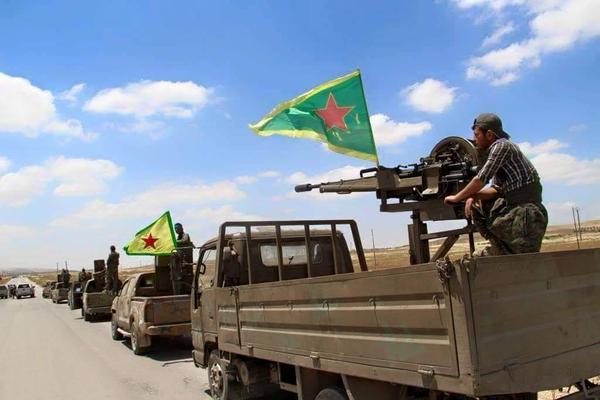The Turkish government is preventing the bodies of 13 people, including one European, killed fighting with the Peoples Protection Units (YPG) from crossing into Turkey from Syria, a rights group told MEE.
According to the Turkish Human Rights Association (IHD), the bodies are waiting in a customs area in an air conditioned container at the border.
“[The fighters’ families] first asked the Sirnak [province] governor and he said that he did not have the authority to let them and that the government in Ankara should let them,” said Raci Bilici, chair of the Diyarbakir branch of IHD.
Among the dead is Kevin Jochim, a 22-year-old German citizen who had travelled to fight with the YPG, killed on 6 July in clashes the town of Tal Abyad, according to the PKK-affiliated Firat News Agency. Bilici said the families first asked for the bodies last weekend, but the government is still refusing to allow them into the country.
“They asked the government who said they would not let them [receive the bodies into Turkey], without giving any reason for that decision – after that, they asked the UN, the EU and the German state and now they are going to make an investigation.”
MEE sent a request for comment to Sirnak’s provincial governor late Thursday, but had not received a response at the time of publication.
In the past, the Turkish government has allowed the bodies of slain YPG fighters, many of whom are from Turkey’s Kurdish community, to cross into its territory.
Bilici suggested the breakdown in Turkish-Kurdish relations following the apparent end of the 2013 ceasefire last week had made the government more reluctant to accept the bodies of Kurdish militia fighters, or tolerate the public outpourings of grief for slain martyrs.
The YPG’s ideological links to the Kurdistan Workers Party (PKK) have meant it has came under scrutiny since the Turkish state began bombing PKK targets in the Qandil mountains in northern Iraq.
Though Turkey has denied that it is targetting the YPG in northern Syria – claiming it is only targetting IS – on Monday, the YPG accused the Turkish military of firing mortar shells on Kurdish-controlled village near the border with Syria. Turkish officials said the military was responding to fire from across the border.
Though the YPG and its political wing the Democratic Union Party (PYD) have a different leadership to the PKK, Turkish President Recep Tayyip Erdogan has stated that the Turkish government regards the two groups as “equal”.
Numerous Europeans have travelled to northern Syria- known to Kurds as Rojava – to fight with the YPG against IS.
In February, Australian Heval Bagok Serhed became the first non-Turkish Western volunteer to die fighting with the YPG in Syria. He was a member of the Lions of Rojava group, who recruit Westerners to fight against IS.
Others have joined groups the Marxist-Leninist Communist Party (MLKP), such as German communist Ivana Hoffman who was the first non-Turkish westerner killed fighting IS in March.
Many have explained their decision to fight not only as a means of countering IS, but also to show support for the YPG’s socialist Democratic Confederalism, which they claim is a project for creating an egalitarian, democratic society in historic Kurdish lands.
“The reason for my joining, was the desire to build up a life with freedom and a different revolution,” Jochim was quoted as saying on the YPG’s website.
“I believed in the Democratic Confederalism system. Besides, my concern was the path of revolution. My engagement, was voluntarily joining with a wholesome heart, a free and ideological determination. I was decisive. It was not my life’s circumstance that brought me here, but my resolution moved me to Rojava.” Middle East Monitor






 WhatsApp us
WhatsApp us 

